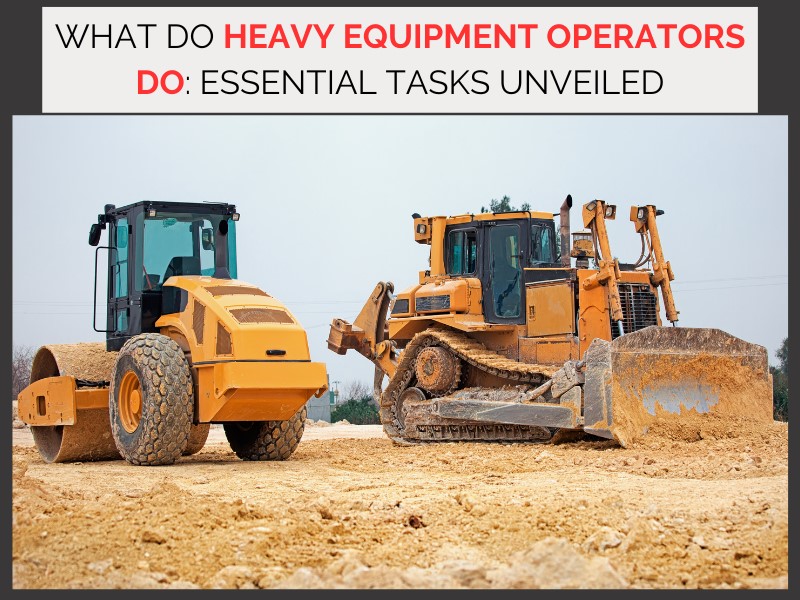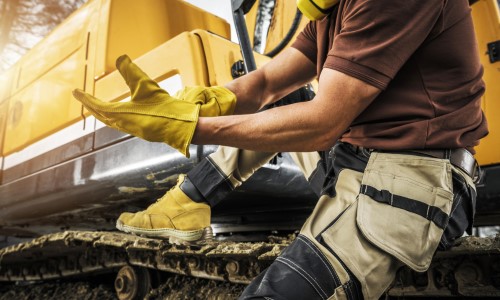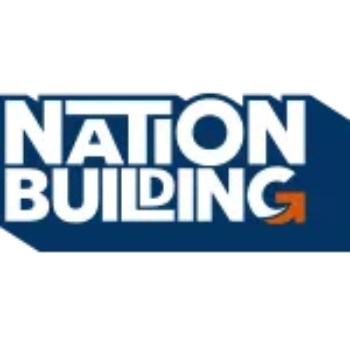The expertise of heavy equipment operators is awe-inspiring, as they are adept at manoeuvring gigantic machines with finesse and revamping natural terrains to create magnificent structures!
Introduction
Heavy equipment operators manage and maintain large construction machinery. They perform tasks that involve earthmoving, lifting, and material transport.

As skilled professionals, these operators play a critical role in various construction projects, from building roads to erecting structures. They are proficient in handling heavy equipment like bulldozers, excavators, cranes, and loaders. Heavy equipment operators ‘ safety and efficiency are top priorities as they navigate these powerful machines in often challenging environments.
Their expertise ensures construction sites operate smoothly, with large-scale tasks completed accurately and on time. These operators must understand machinery mechanics, possess coordination, and clearly grasp the construction plans they execute.
Role Of Heavy Equipment Operators
Heavy equipment operators play a crucial role in construction, mining, and other industries. They handle the big machines that make modern development possible.
Their work includes excavating, lifting, and transporting heavy materials—precise skills and attention to detail ensure each project’s success and safety.
Operate Specialized Machinery
Operating specialized machinery stands at the heart of a heavy equipment operator’s duties. Different machines require different skills.
Operators may work with bulldozers, backhoes, cranes, or dump trucks. They learn to control these powerful vehicles with precision.
- Excavating: They dig up soil or rocks.
- Grading: They level the ground for construction.
- Lifting: They move heavy objects safely.
- Hauling: They transport materials to and from sites.
Follow Safety Regulations
Safety is a top priority in heavy equipment operations. Operators always follow strict regulations to protect themselves and others.
They wear protective gear and check machinery before use. By keeping aware of their surroundings, they prevent accidents. Safety training is ongoing and updated often.
| Regulation | Description |
| Personal Protective Equipment (PPE) | Operators wear safety helmets, vests, and boots. |
| Machine Inspection | Daily checks ensure that equipment is safe to use. |
| Worksite Analysis | Risks are identified and managed before work begins. |
| Emergency Procedures | Operators know how to react in case of an accident. |
Skills And Training
Heavy equipment operators are the backbone of construction sites and large projects. They require a special set of skills and training to safely and efficiently handle large machinery.
These skills ensure the timely completion of projects and guarantee the safety of all on-site workers.
Let’s delve into the essential skills and training one needs to master the art of operating heavy machinery.
Equipment Operation Skills
High-quality equipment management is crucial in this role. Operators need to be skilled at controlling heavy machinery.
They must understand how to navigate various terrain types and assess the equipment’s limits. Here is a list of the core skills:
- Machine Handling: Operating machines smoothly is a must.
- Maintenance Knowledge: Spotting potential issues and performing regular checks prevent downtime.
- Attention to Detail: Noticing small changes can mean preventing big problems.
- Coordination: Managing multiple controls simultaneously is key.
Certifications And Licenses
To legally operate heavy equipment, operators must hold the correct certifications and licenses. Every region has its own requirements. Some common licenses include:
| Equipment Type | Required Certification |
| Excavators | Certified Excavator Operator (CEO) |
| Bulldozers | Certified Bulldozer Operator (CBO) |
| Loaders | Certified Loader Operator (CLO) |
Furthermore, operators must complete safety training programs. Most employers require a high school diploma or equivalent. Some jobs might also need a commercial driver’s license (CDL).
Job Responsibilities

Heavy equipment operators are essential to the construction industry. Their duties involve manipulating machines moving the earth, lifting materials, and supporting the building process.
Let’s delve into what these skilled professionals typically do day-to-day.
Site Preparation
Site preparation is the first step in any construction project. Heavy equipment operators ensure the land is ready for construction.
This includes:
- Clearing the land of rocks, trees, and debris.
- Levelling the ground for foundations.
- Excavating areas for basements or pipes laying.
- Grading the site to direct water flow.
Maintenance Of Equipment
Regular maintenance ensures that the heavy machinery is safe and functional. Responsibilities include:
| Task | Frequency | Importance |
| Cleaning filters | Daily | High |
| Checking fluid levels | Daily | High |
| Inspecting for leaks or damage | Weekly | High |
| Replacing worn parts | As needed | Moderate |
Timely maintenance prevents accidents and costly interruptions.
Work Environment
The work environment for heavy equipment operators is dynamic and varied. These professionals navigate through different conditions daily.
Their roles require adaptability and the ability to work efficiently in diverse settings.
Outdoor Settings
Many heavy equipment operators find themselves in outdoor settings. The reliance on good weather conditions is high. For example, operators may work on:
- Construction sites – Building our communities
- Road projects – Keeping the infrastructure solid
- Mining operations – Extracting valuable resources
- Forestry – Managing natural environments
Equipped with gear to protect from sun, rain, or wind, they must stay alert to safety. Operators also manage tasks amidst noise and dust.
Team Collaboration
Team collaboration is vital in this field. Heavy equipment operators work closely with:
| Team Members | Role |
| Foremen | Directing tasks |
| Labourers | Assisting with ground operations |
| Surveyors | Providing measurements |
| Engineers | Ensuring design accuracy |
Communication and coordination ensure that projects progress smoothly. The goal is always to achieve efficient and safe operations.
Career Opportunities
Exploring the world of heavy equipment operators reveals an array of exciting career opportunities. These skilled professionals play a pivotal role in various industries.
They are responsible for handling the machinery that paves the way for infrastructure and development.
A career in this field offers stability, competitive salaries, and a chance to be part of monumental construction and civil projects.
Construction Industry
The construction sector relies heavily on the expertise of equipment operators. These professionals are the backbone of building projects.
They work on residential, commercial, and industrial sites all around the world.
- Job roles: Excavator operator, crane operator, and bulldozer driver.
- Work environment: Dynamic outdoor sites with different challenges every day.
- Growth prospects: Always bright with the constant demand for construction.
Operators may choose specializations such as road construction or demolition. This niche expertise often leads to higher pay and leadership opportunities.
Government Agencies
Government agencies often have their fleet of heavy machinery. Equipment operators in the public sector maintain and operate this machinery.
This work supports community and national projects.
- Sectors: Transportation, military, and public works.
- Benefits: Job security, comprehensive benefits, and retirement plans.
- Civic impact: Your work directly affects the well-being and growth of local communities.
Operators in these roles serve the public interest. They help ensure that infrastructure projects are completed successfully and on time.
Frequently Asked Questions On Heavy Equipment Operators
What Is A Job Duty Of A Heavy Equipment Operator?
A heavy equipment operator’s job involves manoeuvring and controlling large machinery to assist in construction and maintenance tasks, ensuring safe operation, and complying with safety regulations.
What Is The Highest Paid Heavy Equipment Operator?
Crane operators often receive the highest pay among heavy equipment operators due to the skill and risks involved in their jobs.
What Kind Of Skills Do You Need To Be A Heavy Equipment Operator?
To be a heavy equipment operator, you need strong mechanical skills, excellent coordination, attention to safety protocols, the ability to read and understand manuals, and effective communication skills.
What Are The Functions Of Heavy Equipment?
Heavy equipment functions include construction tasks such as excavation, lifting, material handling, digging, grading, and demolition. These machines are essential for large-scale projects in building and infrastructure development.
Conclusion
Heavy equipment operators are at the core of construction and development projects. Their expertise shapes our infrastructure, enabling growth and progress.
By mastering large machines, they transform landscapes and build foundations for the future. As we have seen, their role is critical, and their skills remain in high demand.
Trusting in their capable hands, we lay the groundwork for tomorrow’s achievements.











